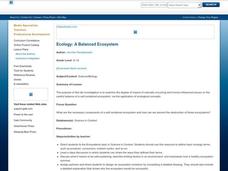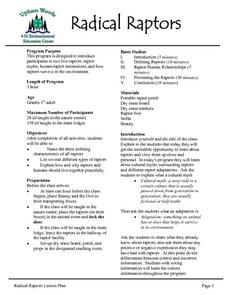Curated OER
Groundwater as Part of the Water Cycle
Ninth graders study the effects of soil and rocks on filtering groundwater. In this groundwater lesson students complete a lab activity that includes sources of contamination.
Wild BC
The Greenhouse Effect: Warming the Earth Experiment
First in a two-part lesson on the greenhouse effect, this lesson involves a classroom demonstration of the phenomenon, and a lab group experiment with color and absorption. Although there are easier ways to demonstrate the greenhouse...
NOAA
Ocean Layers I
How is it possible for ocean water to have layers? The sixth installment of a 23-part NOAA Enrichment in Marine sciences and Oceanography (NEMO) program investigates factors that cause different water densities to occur. Experiments...
Virginia Department of Education
The Cycles of Nature
Encourage peer collaboration and assist with the creation of visual aids to identify carbon, water, and nitrogen cycles as your class learns more about nature. They discuss relative information, create a visual aid depicting the chosen...
Curated OER
Marine Debris
Now is the time to educate tomorrow's citizens to care for the planet, and here is a lesson to help facilitate the process. Collect some marine debris and bring it into class. Have your class separate it into types and then test each...
Curated OER
Marine Debris
Students perform experiments to examine if debris float, or blow in the wind. The effects of these characteristics on the marine debris are then discussed. They determine how a material can influence what becomes marine debris.
Curated OER
Transpiration
Students explain the function of the hydrologic cycle and demonstrate how transpiration rates can be experimentally changed.
Curated OER
Biosphere II
Students continue their examination of the existence of life on Earth. In groups, they determine the role of the water cycle and other biogeochemical cycles play in keeping balance on Earth. They participate in experiments to discover...
Curated OER
Landfills: A Solid Waste Management Plan
Middle schoolers are able to list the types of household waste that they produce daily. They are able to describe some other types of waste that are produced by industry or agriculture to help maintain their lifestyles. Students are...
Curated OER
How Much Water?
Students investigate amount of water available in different countries around the world, compare it to their daily water use, and explore how unequal distribution of water can cause challenges to survival. Students then discuss need to...
Curated OER
Collect Data Using a Transect Line
Students learn about transect lines through a study of marine debris. In this marine debris lesson plan, students calculate the items on a transect line and graph them. Students complete a category worksheet.
Curated OER
Brine Shrimp Hatching Experiment
Students hatch brine shrimp in a classroom experiment. In this hatching brine shrimp lesson, students participate in two-week lab in which they study how brine shrimp hatch under different conditions. They record data about the control...
Curated OER
Ecology
Students gain an understanding of necessary components required within a healthy, sustainable environment and ways human actions can impact that balance while discovering how to recognize and analyze explanations and models used in...
Curated OER
Erosion
Fifth graders study what erosion is, what causes it, and ways to slow its progress. They complete an experiment that depicts soil moving down a slope as water is poured on it to show how moving water erodes land. Next, they observe...
Curated OER
Does the increased use of fertilizers effect biodiversity?
Students conduct a hands-on lab activity in which they analyze a sample of water from a local stream or pond. They introduce a fertilizer solution into the sample and analyze and describe their findings.
Curated OER
Wacky Water Critters
Young scholars visit a local creek or stream. They collect water samples from the creek and observe and sort the "water critters" they find in the sample, observing smaller organisms under a microscope if necessary. They identify each...
Curated OER
Who? Who? Whoooooooo?
Students read Poppy by Avi and then dissect an owl pellet. They complete a KWL chart and play vocabulary games to prepare for the dissection. They examine what the pellet can tell us about the owl's life.
Curated OER
Radical Raptors
Students are introduced to raptors and their role in the environment. They identify three characteristics of raptors and list several types of raptors found in nature. They discuss their positive and negative experiences with raptors and...
Curated OER
Freshwater Macroinvertebrates
Students identify and count Macroinvertebrates at a Hydrology website. For this macroinvertebrates lesson students collect, sort and identify Macroinvertebrates.
Curated OER
Mouthpart Madness
Students explore the basic biology of a pest. They identify the four major kinds of insect mouthparts and explain how they work. Students examine the specific mouthparts and how they can limit food resources and in what environment an...
Curated OER
Scales, Scutes, and Skins
Students identify the various adaptations of reptiles and amphibians. After distinguishing between reptiles and amphibians, students discuss the ways in which their adaptations aid in their survival. They participate in a hands on...
Curated OER
Reduce, Reuse, Recycle
Fourth graders discover the differences between: reduce, reuse, and recycle by performing hands on examinations. They list what would happen to the soil if we allowed the earth to wash away and briefly discuss the meaning of erosion.
Curated OER
The Cricket and The Plant
Students examine determine the symbiotic relationship between plants and animals as the find ways to naturally reduce carbon dioxide emissions. They study the carbon cycle. They work with probe and graphing calculator to examine the...
Curated OER
Junior Engineering Surface Water
Students experience the effects of pollution and erosion on a model of a watershed and explore ways to change the outcome.
Other popular searches
- Ecosystem Bottle Terrarium
- Ecosystem Bottle 3rd Grade
- 2 Liter Bottle Ecosystem
- Ecosystem Bottle Grand 2
- Bottle Ecosystem
- Soda Bottle Ecosystem
- Build an Ecosystem in a Bottle
- Bottle Biology Ecosystem

























